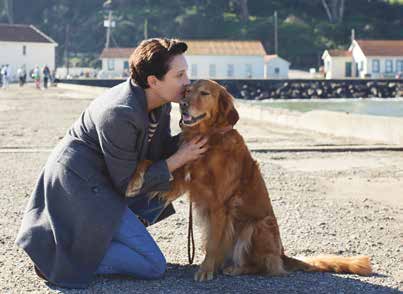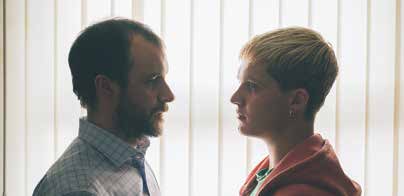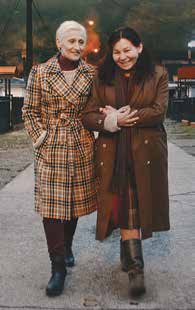
By Gary Kramer–
The 44th edition of the Frameline Film Festival will take place virtually September 17–27 this year. The festival opens with a screening of S–t and Champagne, about San Francisco’s drag queen D’Arcy Drollinger, at the West Wind Solano Drive-in in Concord, CA. Over the next 10 days, there are dozens of features, documentaries, and shorts from 23 countries that showcase LGBTQ life. Here is a rundown of 10 features and 6 shorts playing at this year’s fest.

Based on Patricia Cotter’s play, Beautiful Dreamer (September 18, 6:30 pm) is an engaging, if stagy, drama about Margaret (Erin Daniels), a lesbian in San Francisco, whose best friend Billy (Louis Ozawa Changchien) is moving to Oakland. He and his wife Sara (Jennifer Mudge) are having a second child with a surrogate, Crystal (Tate Moore). Margaret is also struggling with writer’s block, but luckily has a patient and supportive girlfriend, Jen (Kathryn Smith-McGlynn). Things get complicated, however, when Crystal moves in temporarily with Margaret and Jen after Sara’s judgmental mother, Rita (Wendie Malick), arrives. Beautiful Dreamer creates drama as these characters grapple with the meaning of family as well as their expectations and reality—as when Margaret and Jen are asked to be guardians for Billy and Sara’s children. And while the dynamic between Margaret and Crystal is initially awkward, they soon become closer, which creates a conflict. The story is a bit overstuffed, with multiple financial and interpersonal issues defining the characters, but the film benefits from its ensemble cast creating warm, credible relationships. Daniels and Changchien are immensely likable and have an easygoing rapport. In support, Malick plays her prickly part well, and Smith-McGlynn’s is terrific as the no-nonsense Jen who grounds the film whenever it gets too manic.

The German import, No Hard Feelings (September 18, 9 pm), chronicles the relationship that develops between Parvis (Benny Radjaipour), a gay Iranian who was raised in Germany, and the siblings Bana (Banafshe Hourmazdi) and Amon (Eiden Jalali), whom he befriends in a detention center where he works. Parvis begins a romantic relationship with Amon, but Amon wants to keep things secret. Meanwhile, Bana is concerned about deportation. Director/co-writer Faraz Shariat’s film, which won the Teddy award at this year’s Berlin Film Festival, features salient points about immigrant and parental sacrifice, as well as questions of belonging and identity. However, Bana’s story is more interesting than Parvis and Amon’s relationship. Her character injects the film with its verve, which makes No Hard Feelings a bit uneven. The attractive cast provides a strong sense of what life is like for these characters living in limbo, but the film ultimately should have greater impact.

Actor, writer, codirector, and producer Matthew Fifer makes an auspicious feature film debut with the potent romantic drama Cicada (September 19, 4 pm). “Based on true events,” the film has Ben (Fifer) haunted by a childhood trauma, embarking on a relationship with Sam (Sheldon D. Brown), a handsome and closeted African American guy who has his own complicated backstory. How things progress in their lives and relationship create this absorbing film’s drama.
Rialto (September 19, 9 pm) is an intense character study about Colm (Tom Vaughan-Lawlor), whose life is coming apart. His father passed away a month ago, his job is in peril, and he’s becoming increasingly more distant towards his wife Claire (Monica Dolan) and kids, Shane (Scott Graham) and Kerry (Sophie Jo Wasson). The only person he seems to care about is Jay (Tom Glynn-Carney), a teenager who has sex on the down low with Colm for money. The film, directed by Peter Mackie Burns and written by Mark O’Halloran (who adapted his play Trade), is claustrophobic as Colm spirals out of control. Vaughan-Lawlor’s performance rises (or lowers) to the occasion. The way he looks hungrily, pleadingly, at Jay expresses so much desire and self-loathing. But it is his coiled body language that really conveys his internal pain and self-destruction. A drunken speech he gives at one of his lowest points is particularly affecting. Rialto is a heavy, relentless drama, but it is also riveting.

Encounters: International Short Dramas (September 20, 11 am) is an outstanding program of six LBGTQ films about acceptance. The program opens with the excellent Tribunal, in which Javad (Mansoor Noor), an Afghani, is seeking asylum in Australia. His fate may lie in the hands of his sympathetic interpreter, Azar (Shideh Faramand). In the Danish import Babydyke, Frede (Anna Zerbib Streitz) just wants to meet a girl she fancies. However, her efforts to connect are complicated by her big sister Natasja (Levi Eja Roepstorff), whose teasing is unappreciated. Soup, from Russia, chronicles a pivotal moment between a father and son (Andrey Mihhalev and Nikolay Kozak) over a bowl of soup. What is not said is as critical as what is. The French entry, The Edge, may be the weakest in the lineup, because it does nothing new with its familiar premise of two opposites—Malik (Aïmen Derriachi), an Arab, and the queer Jules (Yuming Hey)—meeting on a rooftop and finding common ground. Well shot and nicely performed, the short is slight but predictable. Encounter, from Mexico, is a slow, touching drama about Arcelia (Magda Vizcaino), an aging lesbian, who meets Julian (Hoze Meléndez), a gay teen, during a critical time in her life. The emotional connection these strangers have is the key to this subtle film. Rounding out the program is The Name of the Son, from Argentina, a heartfelt short about a father (Daniel Cabot) and his transgender teenage son, Lucho (Tristán Miranda), during a trip to the beach. Their relationship, which is fraught with tension, culminates in a quietly powerful moment.

Gossamer Folds (September 20, 1:30 pm) is an earnest, well-meaning drama about Tate (Jackson Robert Scott), a 10-year-old boy who moves to suburban Kansas City with his parents, Frannie (Sprague Grayden) and Billy (Shane West). Tate is a curious kid; he carries a pocket dictionary to look up words in a cute, precocious affectation. His parents, however, immediately become concerned about Tate befriending their transgender neighbor Gossamer (Alexandra Grey). Of course, the noble Gossamer is more helpful than harmful, and she looks after Tate when childcare becomes an issue for Frannie. Gossamer Folds imparts obvious life lessons about how to treat transpeople that Tate instinctively knows—and most of the adult characters, including Gossamer’s father (Franklin Ojeda Smith), need to learn. The film allows Grey a nice showcase, but her kindness, sass, and common sense are used to smooth over the film’s many rough patches. Storylines, such as Frannie’s job situation, are dropped, while one, about a trans friend of Gossamer’s being attacked, arise out of nowhere. It is fine that this melodramatic film occasionally lapses into flights of fantasy, but Gossamer Folds, whichis set in 1986, plays up tired, decades-old clichés. Cue Bronski Beat’s “Small Town Boy” on the soundtrack.

Killing Patient Zero (September 20, 4 pm) is a nimble documentary that uses talking heads—including critic B. Ruby Rich, writer Fran Lebowitz, and filmmaker John Grayson—as well as archival footage, newspaper clips, and photographs to humanize Gaetan Dugas, who was dubbed, “The man who brought AIDS to North America.” The film, directed by Laurie Lynd, initially traces how society went from criminalizing homosexuality to the era of gay liberation before AIDS decimated the community. The uncertainty, discrimination, and shame of the disease, especially in its early years, created social and moral dilemmas. Killing Patient Zero contrasts President Reagan’s silence on AIDS with the publicity generated by Randy Shilts naming Dugas in his landmark book And the Band Played On. As friends and family recall Dugas’ friendly personality, AIDS researchers and medical experts doing contact tracing champion his willingness to share information about his partners and provide blood samples. While the documentary raises the negative point that Dugas was resistant to changing his behavior until proof could show transmission occurred through sex, Lynd’s compelling film also acknowledges the impact of Dugas being demonized.

Writer/director Elegance Bratton’s eye-opening documentary Pier Kids (September 21, 7:30 pm) chronicles life as it is lived on New York City streets by a secret society of homeless queer and trans youth. As Krystal, DeSean, and Casper, among others, tell their personal stories to Bratton’s unflinching camera, Pier Kids shows the close-knit community these homeless youths create—and the support they have for each other.

Forgotten Roads (September 22, 6:30 pm) is a poignant drama from Chile about Claudina (Rosa Ramírez), a widow who moves in with her daughter, Alejandra (Gabriela Arancibia), after her husband dies. When Claudina hears Alejandra’s neighbor Elsa (Romana Satt) singing, she investigates, and befriends her. When Claudina confesses to loving another woman when she was a teenager in high school, Elsa kisses her, and awakens her spirits much to Alejandra’s chagrin. Forgotten Roads traces Claudina’s liberation, which includes learning to drive—Elsa teaches her—and going to a gay club, “El Porvenir,” run by Facundo (Raúl Lopen Leiton). But can her happiness last? Forgotten Roads is a simple, but charming film, full of lovely scenes, such as Elsa and Claudina dancing, as well as strange moments—there are regular UFO sightings—but this mix of realism and fantasy, which starts out slow, is quite enchanting.
Writer/director Hong Khaou’s Monsoon(September 22, 8:30 pm) is a gentle, reflective drama about the gay Kit (Henry Golding) returning to Vietnam after three decades abroad. The reason for his journey becomes clear as Kit talks about family, war, and history with his cousin (David Tran), an American he starts dating (Parker Sawyers), and others. Exquisitely filmed, Monsoon is full of quiet moments that let the impact of the characters’ memories and emotions resonate.

Minyan (September 23, 8:30 pm) by out gay filmmaker Eric Steel—he made the documentary The Bridge, about suicide attempts off the Golden Gate bridge—is set in 1986 Brooklyn. David (Samuel H. Levine) is a teenager in the tight-knit Russian Jewish community. After his grandfather Josef (Ron Rifkin) moves into a retirement home, David befriends Josef’s neighbors, Itzik (Mark Margolis) and Herschel (Christopher McCann), two widowers who are now a discreet couple. David is also covertly exploring his own homosexuality, sneaking into a gay bar, and eventually becoming intimate with the sexy bartender (Alex Hurt). Minyan, however, is not a coming out story as much as it is a meandering drama that shows how David reconciles being both Jewish and gay. While the film boasts an impressive, internal performance by Levine, and strong support from the ensemble cast, the plotting is often elliptical, the pacing is slow, and the emotions arguably too subdued. Minyan will be a challenge for some viewers, but it does have an unerring sense of time and place and a feeling for the insular communities it depicts.
© 2020 Gary M. Kramer
Gary M. Kramer is the author of “Independent Queer Cinema: Reviews and Interviews,” and the co-editor of “Directory of World Cinema: Argentina.” Follow him on Twitter @garymkramer
Published on September 10, 2020
Recent Comments